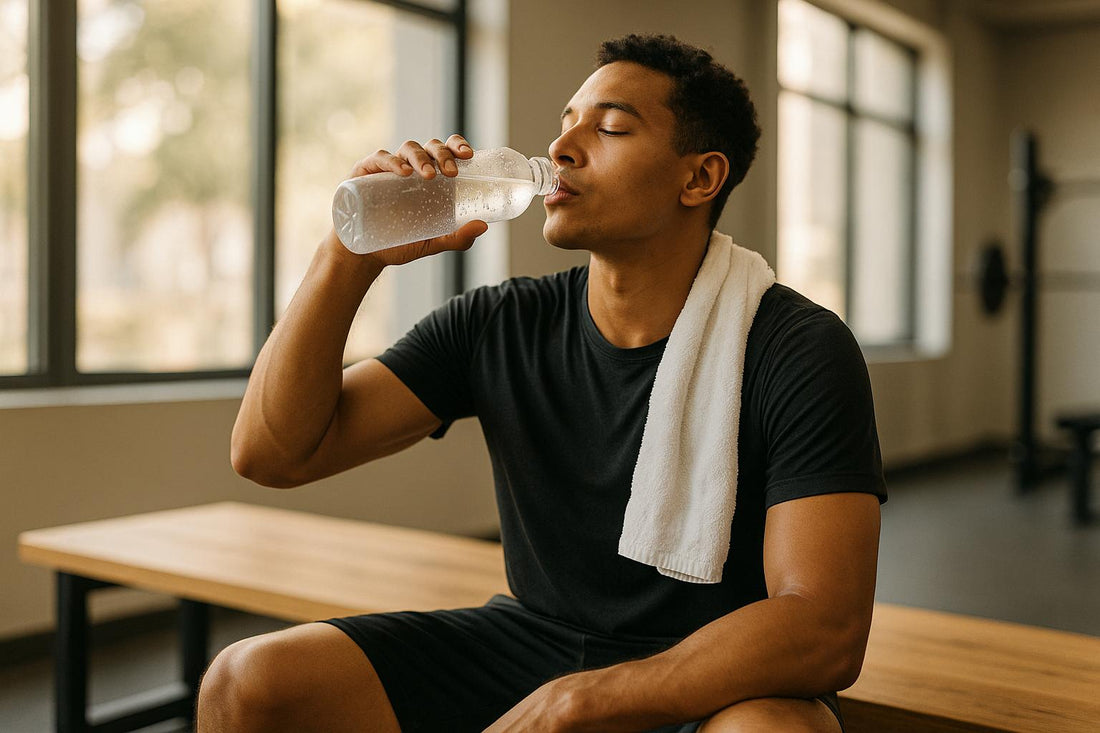
Hydration Timing for Recovery: What Studies Show
Hydration right after exercise is essential for recovery. Drinking fluids promptly helps restore fluids, stabilize cardiovascular function, and transport nutrients like amino acids and electrolytes to muscles. Delayed hydration can slow muscle repair, increase soreness, and hinder waste removal. To recover effectively:
- Start hydrating immediately post-workout and maintain steady fluid intake for 2 hours.
- Replace lost fluids by weighing yourself before and after exercise or drinking based on workout intensity and duration.
- Pair fluids with carbohydrates for faster glycogen replenishment and sodium for better fluid retention.
- Choose hydration methods based on activity: water for light sessions, sports drinks for intense workouts, or rehydration solutions for extreme conditions.
Proper hydration ensures faster recovery, reduced soreness, and better nutrient delivery to muscles.
Should I Keep Drinking Water After a Workout? - CamelBak HydratED

Research Findings on Hydration Timing
Recent studies highlight the importance of hydrating promptly after exercise for optimal recovery. The timing of fluid intake plays a crucial role in how the body bounces back following physical activity. Here's a closer look at how immediate and delayed hydration impact recovery.
Why Hydrating Right After Exercise Matters
Drinking fluids immediately after a workout helps the body recover faster by quickly restoring hydration levels and stabilizing cardiovascular function. This timely rehydration supports muscle repair by improving nutrient delivery and enhancing protein synthesis. It also helps regulate body temperature, enabling the body to concentrate on repairing and rebuilding tissues that were stressed during exercise.
The Downside of Delayed Hydration
On the flip side, waiting too long to rehydrate can slow down the recovery process. Research shows that delaying fluid intake can lead to greater muscle soreness and slower removal of waste products from the body. This can interfere with muscle repair and reduce the efficiency of restoring blood volume, ultimately hindering overall performance.
How Hydration Timing Affects Recovery Processes
Drinking water at the right time can kickstart your body’s recovery after exercise. When your muscles are hydrated, they’re better equipped to transport nutrients, like amino acids, which are essential for muscle protein synthesis. This process is key to repairing and rebuilding tissues after a workout.
Another perk of rehydrating quickly is restoring glycogen levels. Proper hydration improves blood flow, ensuring that nutrients reach your muscles efficiently to replenish energy stores.
Electrolyte balance is also crucial. During exercise, you lose not only water but also important minerals like sodium and potassium. Rehydrating soon after helps replenish these electrolytes, which are vital for cell function and recovery. Adding sodium and carbohydrates to your fluids can take this a step further, aiding in better fluid retention and speeding up the recovery process.
Sodium and Carbohydrates in Hydration
Mixing sodium and carbohydrates into your post-workout hydration can give you more than just basic rehydration. Sodium helps your body retain fluids, while carbohydrates accelerate fluid absorption and provide a quick energy boost. Together, they create a powerful combination that supports hydration and replenishes energy stores, making them an important part of your recovery routine.
Dehydration and Muscle Repair
On the flip side, not drinking enough water can slow down your recovery. Dehydration reduces blood volume, which hampers the delivery of oxygen and nutrients to tired muscles. This delay can make muscle repair take longer. It also slows the removal of metabolic waste, leading to prolonged inflammation and discomfort. Plus, dehydration can mess with your body’s ability to regulate temperature, adding extra stress to your recovery efforts.
sbb-itb-132bd3c
Guidelines for Post-Workout Hydration
Recovering after a workout starts with proper hydration. The key is simple: begin rehydrating as soon as you finish exercising and continue to sip fluids steadily. Research shows that both the timing and amount of fluid intake are critical for helping your body recover effectively.
Experts recommend starting the rehydration process right after your workout and maintaining a steady intake over the next two hours. This gradual approach supports your body as it restores its natural balance.
Fluid Intake Recommendations
One way to estimate how much fluid you need is by weighing yourself before and after your workout. The difference gives you a rough idea of how much water your body lost. Aim to replace that amount gradually in the hours following exercise, keeping in mind that your body may continue losing water as it cools down.
If stepping on a scale isn’t practical, simply start hydrating immediately and drink fluids regularly. Adjust your intake based on factors like how hard you exercised, how long the session lasted, and the temperature of your environment. Even the temperature of the drink itself matters - cool beverages can feel refreshing and may help lower body heat, especially after intense activity.
Once you’ve gauged your hydration needs, the next step is choosing the best method to restore balance efficiently.
Comparing Hydration Methods
Different hydration options suit different types of workouts. Here's a quick comparison:
| Hydration Method | Best For | Benefits | Limitations |
|---|---|---|---|
| Plain Water | Short or light workouts | Easy to absorb, calorie-free, and widely available | Doesn’t replace lost electrolytes |
| Sports Drinks | Long or high-intensity sessions | Replenishes electrolytes and offers carbohydrates for energy | May contain extra calories or additives |
| Oral Rehydration Solutions | Severe fluid loss or dehydration | Balanced mix of electrolytes and sugars for optimal absorption | Often unnecessary for regular exercise |
For most casual workouts, plain water does the job just fine. If your session was longer or more intense, sports drinks can help by replacing both fluids and electrolytes. On the other hand, oral rehydration solutions are typically reserved for extreme cases, like prolonged activity in hot or humid conditions where dehydration risks are higher.
The bottom line? Start rehydrating as soon as possible and choose a drink that matches the intensity and demands of your workout. This way, you’ll set yourself up for a smoother recovery.
Tools and Products for Better Hydration
Having the right tools can make staying hydrated easier and more effective, especially when you're focused on recovery. Choosing options that are functional and eco-friendly not only supports your health but also helps reduce waste.
Reusable Hydration Tools
Glass water bottles are a fantastic alternative to plastic. They keep your drinks tasting fresh and free from contaminants. For example, the SG Glass Hydra Bottle, priced at $9.97, is BPA-free, environmentally friendly, and designed with your health in mind. Plus, the clear design allows you to see how much water you've consumed, making it simple to track your hydration throughout the day.
Cooling accessories can take your hydration game to the next level, especially after a tough workout. The SG Cool Hydra ICE Towel 2-pack, available for $14.97, offers instant cooling relief. Just soak the towel in water, snap it, and drape it over your skin to help lower your body temperature while you rehydrate. This is especially useful after high-intensity sessions or exercising in hot weather.
These tools not only make hydration easier but also help cut down on single-use plastics. While the upfront cost might seem like an investment, their durability and reusability make them a smart choice for both your wallet and the planet. Beyond tools, combining hydration with proper nutrition can further speed up your recovery.
Combining Hydration with Nutrition for Recovery
Pairing hydration with the right nutrients can amplify recovery after exercise.
Protein timing is a great example. The Pur Zealand 100% Grass-Fed Whey Protein, priced at $37.99, is an excellent source of clean protein. It mixes effortlessly with water or other recovery drinks, making it easy to address both protein and hydration needs right after a workout. This grass-fed whey provides all the essential amino acids your muscles need to rebuild and recover.
Healthy fats can also play an important role. Adding 1–2 tablespoons of High Octane Organic MCT Oil, priced at $32.97, to your post-workout routine delivers quick energy and aids in nutrient absorption. MCTs are digested quickly and won't interfere with hydration like heavier fats sometimes can.
Omega-3 fatty acids are another powerful addition to your recovery plan. The Omega 3 Pharmaceutical Grade Fish Oil, at $64.97, provides cold-processed, molecularly distilled omega-3s. These support your body's natural anti-inflammatory processes and promote cellular recovery, especially when paired with proper hydration.
The trick is to time these nutrients alongside your fluid intake. Start with water or an electrolyte drink immediately after your workout to address hydration. Then, over the next few hours, incorporate protein and other nutrients to support muscle repair and energy replenishment. This step-by-step approach ensures you're covering both immediate and long-term recovery needs.
Conclusion: Main Points on Hydration Timing
Studies show that drinking water right after a workout helps speed up recovery. It replaces lost fluids, improves how nutrients are delivered to your body, and aids in repairing muscles. To get the most out of this, start hydrating before you even feel thirsty.
FAQs
Why is it important to rehydrate right after a workout, and what happens if you wait too long?
Rehydrating right after a workout is crucial for replacing lost fluids and electrolytes. This not only helps you avoid dehydration but also aids in quicker recovery. Staying properly hydrated can lessen the chances of muscle cramps, fatigue, and overheating - issues that can seriously affect both your performance and overall well-being.
Delaying hydration can make recovery harder for your body. You might experience reduced blood volume, weaker muscle function, a higher core temperature, and lingering fatigue, all of which can slow you down and make your next workout tougher. By focusing on hydration immediately, you give your body the tools it needs to recover effectively and stay ready for peak performance.
How much water should I drink after exercising, and what factors affect my hydration needs?
To rehydrate effectively after exercise, aim to drink 16 to 24 ounces of water for every pound of body weight you lose during your workout. A simple way to gauge this is by weighing yourself before and after exercising. Make sure to replace those fluids within 2 to 6 hours to support recovery.
Hydration needs can differ depending on several factors, including your sweat rate, workout intensity, weather conditions (like heat or humidity), and even the type of clothing you wear. Additionally, personal health factors - such as medical conditions or medications - might influence how much fluid you need. Adjust your water intake to match your specific situation and keep your body performing at its best.
Why is it beneficial to include sodium and carbohydrates in your post-workout hydration routine?
Including sodium and carbohydrates in your post-workout hydration routine can play a key role in speeding up recovery. Sodium works to maintain fluid balance by encouraging water retention and replacing lost electrolytes, which can help reduce muscle cramps and swelling. Meanwhile, carbohydrates replenish the glycogen in your muscles, giving them the energy they need to repair and recover more effectively.
This duo not only promotes better hydration but also helps prevent the fatigue that often comes with dehydration. By rehydrating shortly after your workout, you give your body the nutrients it needs when it’s most primed to absorb them, setting yourself up for a quicker recovery and better performance in your next session.
